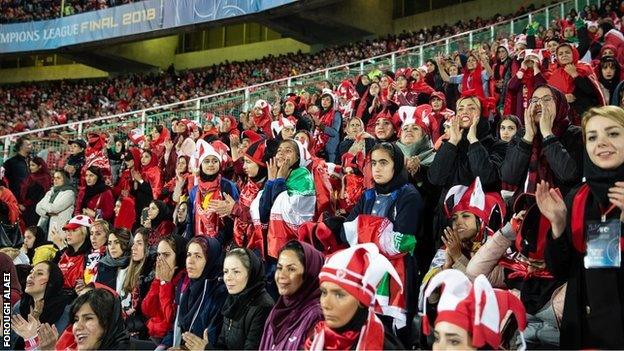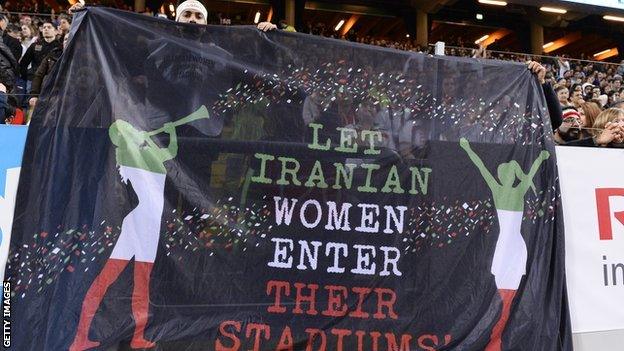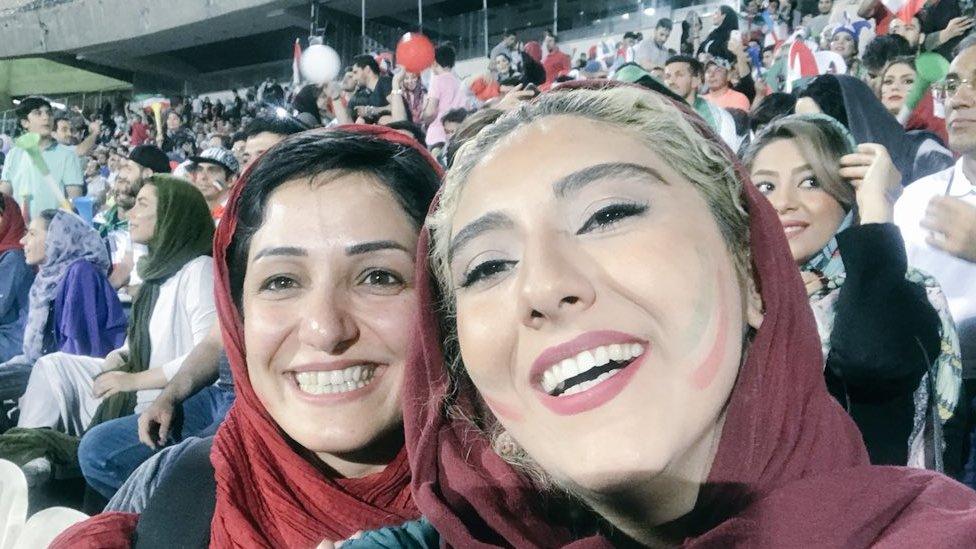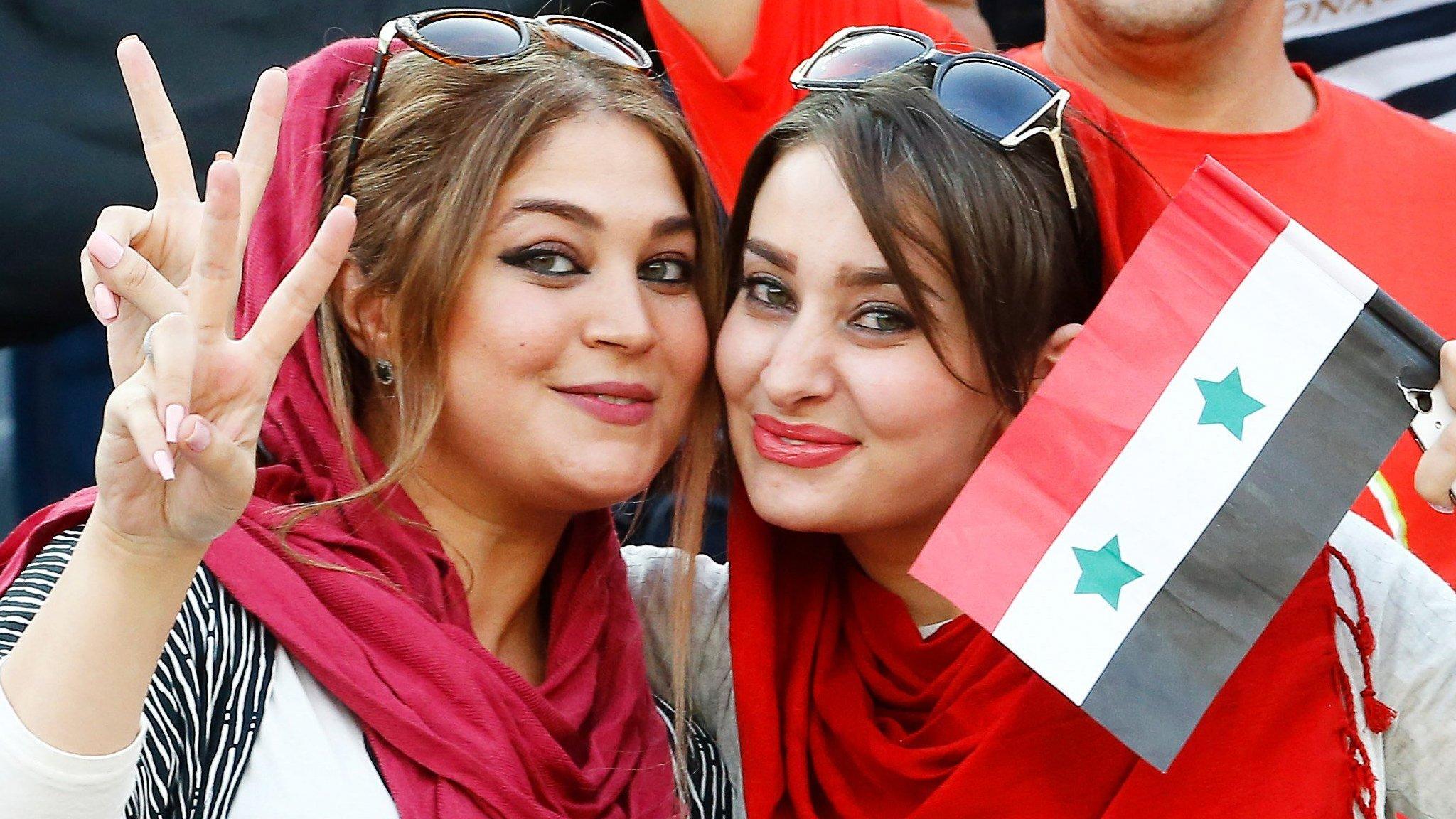Iranian government criticised as women stadium entry deadline looms
- Published

A few hundred female fans were allowed into the Azadi stadium to watch a match in 2018
Iran's government has been criticised for failing to guarantee women can attend official football matches as the new season kicks off.
A deadline looms from Fifa - football's world governing body - for Iran to lift its long-standing ban on women's entry to the country's stadiums.
Government spokesman Ali Rabiei said procedures were being worked out to allow women to attend national team games.
"Social issues need to be resolved considering cultural principles and the existing regulations," he said.
The sports minister has made it clear that, for the time being, women may only be allowed to attend national games at Tehran's Azadi Stadium.
Crackdown on 'bearded girls'
There is mounting criticism over what has been described as the government's "indifference" to the recent arrest of a number of female fans who had attended matches - mostly last season at the Azadi Stadium - disguising themselves as men.
A growing number of Iranian women have been dressing up as men so they can support their favourite clubs, despite the ruling Islamic establishment banning them from going to games.
They have been referred to as "bearded girls" and, more recently, the 'Azadi (Liberty) Girls'.
Activists have described the arrests as part of a new crackdown on women trying to enter stadiums before the new season of the Iranian Pro League (aka Iranian Premier League), which starts on 22 August. The fans, who were arrested along with an Iranian winner of the World Press Photo award, were freed on bail on 17 August, pending trial.
The women's relatives said they were detained by members of the Intelligence Organisation of the Islamic Revolution Guards Corps (IRGC) after Mehdi Taj, head of Iran's Football Federation (FFIRI), lodged a complaint against them. A federation spokesman has denied, external the body's involvement in the case.
"Many people believe the government did not have a role in the arrest of bearded girls. OK, but the government has not even reacted to this and is keeping silent. It means their reform slogans are all talk and they will abandon the people as soon as they take office," reformist journalist Sepehr Khorrami wrote, external on Twitter.
Fifa seeks assurances

Protesters have long called for women football fans to watch live games
Fifa has been working with Iranian authorities to lift the unofficial - mostly religious - ban, which has been enforced since the 1979 Islamic revolution.
In a letter to the FFIRI in June, Fifa president Gianni Infantino sought assurances Iran would allow women to attend their 2022 World Cup qualifiers, with the first home match due to take place on 10 October against Cambodia.
Senior FFIRI official Dariush Mostafavi says there is another deadline his country should meet as per Fifa instructions. Iran has until 31 August to "pave the way" for women's stadium entry for Pro League matches, Mostafavi said.
On 17 August, Shargh newspaper published a report outlining the complications regarding women's attendance in stadium matches. The article criticised the government for failing "to fulfil its duty to provide women with their basic civil and human rights". Its author, Shahrzad Hemmati, predicted that at the end only a select number of women would be able to attend.
Last year, Iran allowed only a group of hand-picked women to attend the Asian Champions League final match in Tehran between the country's most popular club Persepolis and Japan's Kashima Antlers.
Seeking ayatollahs' approval
The president of National Olympic Committee, Reza Salehi Amiri, was quoted by Shargh newspaper as saying the matter needed to be discussed with the country's grand ayatollahs before the sports authorities make any decision.
"We need to reassure them that we are going to take care of the issue of vulgarity and that seems possible to me. We need to visit the city of Qom [where most Shia grand ayatollahs live] and talk to the senior clerics," said Salehi Amiri, who is the second highest-ranking sports official in Iran.
He also speculated that if the stadium gates were opened to women they might eventually lose interest in attending "as they will feel that the restrictions on them have been removed".
Inappropriate conduct
The hardline concerns centre around inappropriate dress and mingling with different sexes at the stadiums.
"The situation in the stadiums is not suitable for women, and there is no doubt that the youth's mingling and freedom is the source of many moral and social problems. In addition, in some sports, what men wear is not proper for women [to watch]. Therefore, they need to refrain from attending such events, especially since they can watch them on TV, so their physical presence will be unnecessary," news agencies quoted Grand Ayatollah Naser Makarem Shirazi as saying.
Meanwhile, Iran's prosecutor-general, Hojjat-ol Eslam Mohammad Jafar Montazeri, criticised Fifa for demanding that Tehran allow women in stadiums to watch men's games.
"When a woman goes to the stadium and sees half-naked men in sports clothing, sin is committed," said Montazeri.
BBC Monitoring, external reports and analyses news from TV, radio, web and print media around the world. You can follow BBC Monitoring on Twitter, external and Facebook, external.
- Attribution
- Published21 June 2018

- Attribution
- Published5 September 2017
